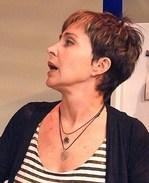SITE GUIDE
SEARCH
REVIEWS
REVIEW ARCHIVES
ADVERTISING AT CURTAINUP
FEATURES
NEWS
Etcetera and
Short Term Listings
LISTINGS
Broadway
Off-Broadway
NYC Restaurants
BOOKS and CDs
OTHER PLACES
Berkshires
London
California
New Jersey
Philadelphia
Elsewhere
QUOTES
TKTS
PLAYWRIGHTS' ALBUMS
LETTERS TO EDITOR
FILM
LINKS
MISCELLANEOUS
Free Updates
Masthead
A CurtainUp Los Angeles Review
AfterMath
|
I can't take it anymore. Take care of the kids. Sell the car. —Suicide note,
—
|

Annie Potts
(Photo credit: Ed Krieger) |
Laudable motives notwithstanding, AfterMath's mission is accomplished and then some. The world premiere of Shoenman's play, with a not always recognizable Annie Potts leading a cast of four for the playwright's Inkwell Theater, is simultaneously tough, heartbreaking and relentless; and, one very much suspects, potentially therapeutic.
Granted, it's not always a lot of fun to watch 80 minutes of a family this deep in crisis, but the playwright, director Mark L. Taylor and the company know which beats make for good drama. AfterMath has its comic moments as well, and not just because its hot-flash experiencing heroine Julie (played by Potts) occasionally has to place a bag of frozen vegetables on her head to get through an already uncomfortable New York summer.
An on-the-fritz air conditioner should be the least of Julie's problems. It has been three years since her husband Bob left his clothes and that insufficient 14 word suicide note on a bench and jumped into the Hudson River. Julie, who enjoys some good gallows humor even in the best of times, could use some closure. She's seriously steamed that Bob took his life, and even more angry that there appeared to be neither recognizable signs nor a compelling reason. A part-time worker at Bloomingdale's, she clashes frequently with Eric (Daniel Taylor), the mopey son who dropped out of school to live with her. Her older daughter Natalie (Meredith Bishop), is a weather forecaster with boyfriend trouble and a career on the rise who doesn't come around that often. Bob was Natalie's stepfather, but the two were close.
After Julie and Eric have a too angry fight, the various crossroads become clear. Eric wants to light out for Los Angeles, Natalie is up for a promotion that might take her to Atlanta and Julie is stuck somewhere between needing to assert her "I don't need anyone" independence and facing life alone. Bob's best friend Chuck (Michael Mantell) is a regular comfort who could become more that that, but Julie isn't quite ready to take that road. Somewhat inexplicably, both kids seem to hate Chuck.
As the title suggests, many of these very thorny issues stem from Bob's suicide and from Julie, Natalie and Eric's inability to work through their hurt, guilt, jealousies and rage. If the play sometimes comes across as one long, multi-tentacled fight scene, well, life can be that way sometimes. Taylor's handling of this isn't always neat or especially crisp, the production doesn't suffer as a result.
TV doesn't always convey how very petite Annie Potts is and has always been. Small, however, is not fragile, and her Julie is wiry bundle of hugs and rage. Sporting a thick Brooklyn accent, Potts's character has earned every last facial line, every tear and tremor. It's powerful work, never over-the-top. Bishop's Natalie, trying so hard to be the one who keeps things together and Taylor's damaged Eric balance her nicely. Watching the manner in which Potts snuggles with and caresses her daughter, you can't help thinking, here's a family that could actually be a family.
Shoenman ensures that Bob, the play's unseen fifth character, gets vilified and at least partially vindicated. Julie may miss him, but she's hardle above and slipping in references to his inadequacies; Chuck, for example, is clearly the better handyman. At the same time, AfterMath is not simply the playwright's depiction of a father who through a selfish act destroyed his family. (The playwright has also written a book, Nobody's Business about his father and his family's hurt).
Ultimately Bob had his reasons, and now it's his family's task if not to completely understand, to find a way to move forward. At AfterMath's conclusion, we have the hope that such a possibility exists. And we have even laughed along the way.
|
AfterMath By Elliot Shoenman Directed by Mark L. Taylor Cast: Annie Potts (Julie), Daniel Taylor (Eric) Meredith Bishop (Natalie), Michael Mantell (Chuck) Stage Manager: Brittany Morrison Set Design: Gary Guidinger Costume Design: Linda Serijan-Fasmer Lighting Design: Jeremy Pivnick Sound Design and Original Music: Bennett Barbakow Running Time: 1 hours and 20 minutes with no intermission Matrix Theatre, 7657 Melrose Ave., Los Angeles (800) 595-4849, www.aftermaththeplay.com From May 21 to June 26 Thu-Sat. @ 8pm, Sun @ 2 pm Reviewed by Evan Henerson, based on May. 29 performance. |
|
REVIEW FEEDBACK Highlight one of the responses below and click "copy" or"CTRL+C"
Paste the highlighted text into the subject line (CTRL+ V): Feel free to add detailed comments in the body of the email. . .also the names and emails of any friends to whom you'd like us to forward a copy of this review. Visit Curtainup's Blog Annex For a feed to reviews and features as they are posted add http://curtainupnewlinks.blogspot.com to your reader Curtainup at Facebook . . . Curtainup at Twitter Subscribe to our FREE email updates: E-mail: esommer@curtainup.comesommer@curtainup.com put SUBSCRIBE CURTAINUP EMAIL UPDATE in the subject line and your full name and email address in the body of the message. If you can spare a minute, tell us how you came to CurtainUp and from what part of the country. |



